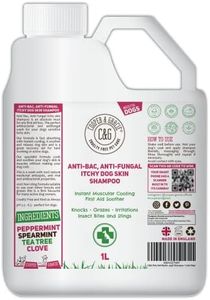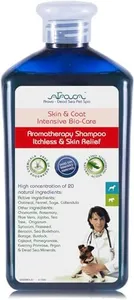We Use CookiesWe use cookies to enhance the security, performance,
functionality and for analytical and promotional activities. By continuing to browse this site you
are agreeing to our privacy policy
10 Best Antifungal Dog Shampoos
From leading brands and best sellers available on the web.By clicking on a link to a third party's website, log data is shared with that third party.
Buying Guide for the Best Antifungal Dog Shampoos
Choosing the right antifungal dog shampoo is important for keeping your pet’s skin healthy and comfortable, especially if they are dealing with fungal infections like yeast or ringworm. The main goal is to select a shampoo that is safe, effective, and suited for your dog’s individual skin and coat needs. It’s a good idea to consult your veterinarian before selecting an antifungal shampoo, as they can help determine what ingredients or formulas will work best for your pet’s specific condition. Understanding the key specs will help you feel confident in your choice and ensure your dog gets the relief they need.Active IngredientThe active ingredient is what gives the shampoo its antifungal power, targeting and eliminating the fungus causing your dog's skin issues. Common active ingredients include chlorhexidine, miconazole, and ketoconazole. Chlorhexidine is gentle and works for broader skin health, miconazole is often used for yeast infections, and ketoconazole is very effective but can be stronger on sensitive skin. If your dog has mild symptoms or you’re unsure, a general-purpose antifungal may suffice, but for persistent or severe issues, you may need a formula containing a more potent ingredient, ideally guided by your vet.
Additional IngredientsBesides antifungal agents, shampoos often include other components like moisturizers (oatmeal, aloe vera) or antibacterial agents. These help soothe itching, promote healing, and prevent secondary infections. If your dog has dry or sensitive skin, look for shampoos with added gentle moisturizers. For dogs prone to bacterial infections as well, a formula with both antifungal and antibacterial action can be helpful. Think about your dog’s skin type and any additional concerns (such as itch or irritation), and pick a shampoo with ingredients that address those issues.
Fragrance and SensitivitySome antifungal dog shampoos are scented while others are fragrance-free. Fragrance can help with odor control, especially if your dog has a strong smell due to a skin infection. However, for dogs with sensitive skin or allergies, fragrances and artificial dyes can irritate and worsen their condition. Choose fragrance-free, hypoallergenic versions if your dog has a history of reactions or very sensitive skin, but if odor is a big concern and your dog is not sensitive, a light scent may be suitable.
Lather and Rinse-abilityShampoos vary in how easily they lather and rinse out. Good lathering helps spread the shampoo evenly and ensures the active ingredients reach the skin, while easy rinse-out is important for preventing residue that could irritate your dog. For dogs who dislike bath time or are impatient, a shampoo that rinses out quickly will make the process less stressful. If you have a large or thick-coated breed, a shampoo that lathers well will help you cover all areas thoroughly.
Frequency of UseSome antifungal shampoos are designed for daily or frequent use, while others are meant for weekly or less-frequent application due to their potency. More frequent-use shampoos are typically milder and less likely to dry out the skin, whereas potent formulas can be harsh if overused. Check the label for recommendations and align the frequency with your needs—choose a gentle, frequent-use option for regular maintenance, and reserve stronger shampoos for more severe flare-ups or as directed by your veterinarian.
pH BalanceDog skin has a different pH than human skin, so shampoos should be specially formulated for canine use. A correct pH balance prevents additional irritation or disruption of the natural skin barrier. Always pick a shampoo labeled as 'pH-balanced for dogs' to ensure safety and effectiveness, especially if your pet has ongoing skin issues.














